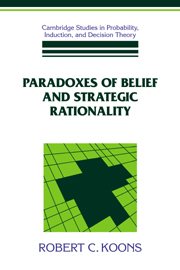Book contents
- Frontmatter
- Contents
- Preface
- Introduction
- Part I Paradoxes
- 1 Doxic paradoxes without self-reference
- 2 Doxic paradoxes and reputation effects in iterated games
- 3 A study of liar-like epistemic paradoxes
- 4 A computational account of mutual belief
- Part II Solutions
- Conclusion
- Appendix A Applying probability to mathematical sentences
- Appendix B Proofs of Theorems 2 and 3 from Chapter 6
- Appendix C On schematic generalization
- Bibliography
- Index
4 - A computational account of mutual belief
Published online by Cambridge University Press: 06 January 2010
- Frontmatter
- Contents
- Preface
- Introduction
- Part I Paradoxes
- 1 Doxic paradoxes without self-reference
- 2 Doxic paradoxes and reputation effects in iterated games
- 3 A study of liar-like epistemic paradoxes
- 4 A computational account of mutual belief
- Part II Solutions
- Conclusion
- Appendix A Applying probability to mathematical sentences
- Appendix B Proofs of Theorems 2 and 3 from Chapter 6
- Appendix C On schematic generalization
- Bibliography
- Index
Summary
I argued in Chapter 1 that doxic paradox cannot be averted simply by blocking self-reference through some sort of rigid Russellian or Montagovian type theory. In this chapter, I want to reinforce that argument by contending that, in any case, the loss of the capacity for significant self-reference is too high a price to pay. I will develop an account of the phenomenon of common or mutual belief that is representational or computational, thereby illustrating the crucial importance of the kind of reflective reasoning that generates the paradoxes.
The notion of ‘common knowledge’ appears in several theoretical contexts: in linguistics (the pragmatics of definite reference), in social philosophy (the theory of conventions), and in certain branches of game theory (noncooperative Nash equilibrium theory). To be more precise, the notion that these disciplines employ would be more aptly described as “mutual belief,” since Gettier-like distinctions between knowledge and justified true belief are quite irrelevant.
Herbert H. Clark and Catherine R. Marshall, drawing on work by H.P. Grice, argue that the presence of mutual belief is essential to the pragmatics of expressions of definite reference: expressions like ‘the mess I made’ or ‘that animal’. They discuss a vignette in which Ann asks Bob, ‘Have you seen the movie at the Roxie tonight?’ Let ‘t’ abbreviate ‘the movie at the Roxie’, and let R be Monkey Business, the movie actually playing at the Roxie that night.
Information
- Type
- Chapter
- Information
- Paradoxes of Belief and Strategic Rationality , pp. 62 - 82Publisher: Cambridge University PressPrint publication year: 1992
